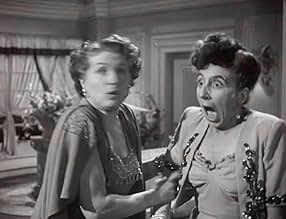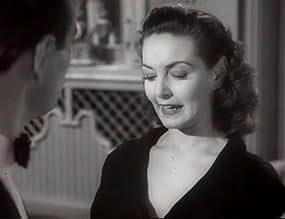Upper class young man has to resort to employment, together with his valet/butler in tow. He finds a job escourting a robot out for an evening, and they end up in a hotel and a farce ensues ... Read allUpper class young man has to resort to employment, together with his valet/butler in tow. He finds a job escourting a robot out for an evening, and they end up in a hotel and a farce ensues when roles are swapped.Upper class young man has to resort to employment, together with his valet/butler in tow. He finds a job escourting a robot out for an evening, and they end up in a hotel and a farce ensues when roles are swapped.
Anita Sharp-Bolster
- Lady Diana
- (as Anita Bolster)
Patti Morgan
- Telephonist
- (uncredited)
Geoffrey Sumner
- Well Dressed Man On Underground
- (uncredited)
Featured reviews
A promising cast and premise are wasted in this woefully weak effort. The absence of a sharp script and tight direction is made worse by desperate over-acting. The participants were rewarded for the time they spent on the film. Unlike the viewers.
For some reason the director and actors seemed to be under the impression that if you acted in a maniacal fashion and speeded up your delivery everything would be hilarious.Instead it is an example of how not to film a farce.It makes even Brian Rix look restrained.Irene Handel and Miles Malleson are a joy as they are working at their own usual sedate pace.However what on earth were Patrick,Holloway and Roc playing at.Even as a robot Roc was wooden ,or should that be metallic.It is difficult to believe that Stanley Holloway gave a worse performance than this.I normally enjoy watching Nigel Patrick,but not in this.He literally chews the scenery.Little wonder that the British film industry was starring down at the precipice when this film was made.films of this type would help push it over the edge.
Roger Cavendish, an idle and rather useless upper-class young man, and his butler Ramshead discover that they are broke because Roger's main source of income, his rich aunt, has stopped his allowance until he gets a job. (They were probably based upon Wodehouse's Bertie Wooster and Jeeves). A search of the "situations vacant" column in "The Times" leads them to an eccentric, absent-minded professor who has created a robot woman which he calls "Olga". (The "Perfect Woman" of the title). The professor employs them to look after Olga for a week and take her into London to see if anyone can tell that she is not a real woman. Complications arise when the professor's beautiful niece, Penelope, decides to look for adventure and pretends to be Olga. (This is easier than it seems because her uncle has based the robot's appearance on Penelope's own looks). The film then explores the complications which ensue.
The film was a success when first released, but it is not well-known today, even though it occasionally turns up on television. I note that mine is only the twelfth review it has received. This is probably because it is an adaptation of a farce originally written for the stage. Farce was once a popular genre in the British theatre, but has lost ground in recent decades, and never really transferred well to the screen. For example, "No Sex Please, We're British" was a huge hit in the theatre during the seventies and eighties, but the film version was less successful even at the time, and is virtually unwatchable today, as is "Don't Just Lie There, Say Something!", another seventies film based upon a stage farce. Both those films are based upon the lazy assumption that sex is hilariously funny and that any mention of a sexual topic must therefore be good for a laugh. "The Perfect Woman" is not quite as bad as either of those awful examples, largely because in the forties both the Lord Chamberlain's Office, which governed censorship in the theatre, and its cinematic equivalent, the British Board of Film Censors, took a puritanical view of sexual humour, meaning that comic playwrights and screenwriters had to work harder for their laughs.
I can imagine that a film like this came across as quite funny in 1949. The lovely Patricia Roc makes Penelope a spirited heroine. I assumed that Roc was also playing Olga the Robot, but in fact that role went to an otherwise little-known actress named Pamela Devis, cast on the basis of her physical resemblance. (With modern computer trickery it would today be quite easy to have the same actress playing two different characters in the same scene, but perhaps this would not have been possible in the forties). Nigel Patrick and Stanley Holloway, however, seem to be trying too hard as Cavendish and Ramshead; Holloway in particular came across as too frenetic, which disappointed me as I have admired some of his other performances such as those he gave in "Passport to Pimlico" (also from 1949) and "My Fair Lady". The main problem with the film, however, is that its style of humour seems just too old-fashioned for the tastes of modern audiences. 5/10.
The film was a success when first released, but it is not well-known today, even though it occasionally turns up on television. I note that mine is only the twelfth review it has received. This is probably because it is an adaptation of a farce originally written for the stage. Farce was once a popular genre in the British theatre, but has lost ground in recent decades, and never really transferred well to the screen. For example, "No Sex Please, We're British" was a huge hit in the theatre during the seventies and eighties, but the film version was less successful even at the time, and is virtually unwatchable today, as is "Don't Just Lie There, Say Something!", another seventies film based upon a stage farce. Both those films are based upon the lazy assumption that sex is hilariously funny and that any mention of a sexual topic must therefore be good for a laugh. "The Perfect Woman" is not quite as bad as either of those awful examples, largely because in the forties both the Lord Chamberlain's Office, which governed censorship in the theatre, and its cinematic equivalent, the British Board of Film Censors, took a puritanical view of sexual humour, meaning that comic playwrights and screenwriters had to work harder for their laughs.
I can imagine that a film like this came across as quite funny in 1949. The lovely Patricia Roc makes Penelope a spirited heroine. I assumed that Roc was also playing Olga the Robot, but in fact that role went to an otherwise little-known actress named Pamela Devis, cast on the basis of her physical resemblance. (With modern computer trickery it would today be quite easy to have the same actress playing two different characters in the same scene, but perhaps this would not have been possible in the forties). Nigel Patrick and Stanley Holloway, however, seem to be trying too hard as Cavendish and Ramshead; Holloway in particular came across as too frenetic, which disappointed me as I have admired some of his other performances such as those he gave in "Passport to Pimlico" (also from 1949) and "My Fair Lady". The main problem with the film, however, is that its style of humour seems just too old-fashioned for the tastes of modern audiences. 5/10.
Nigel Patrick is to begin a job in a few weeks. Until then, his aunt, Philippa Gill, won't let him have any money. He and his valet, Stanley Holloway answer an ad from Miles Malleson. Malleson has just built a robot he has modeled on his niece, Patricia Roc. For plot purposes, he wants Patrick to field-test the automaton in a hotel. Meanwhile, he is reminded that he has a lecture give that evening. Miss Roc -- the real one; the fake one is played by the appropriately named Pamela Devis -- has been housebound too long and decides to pose as the robot for a night on the town.
This is a set-up for a farce that the movies have been using at least since Lubitsch's DIE PUPPE.. Like many a post-war British sex farce, it seems a bit sniggering and brittle, but the cast is perfect. Not only was Malleson born to play woolly-brained old men, but there's Irene Handl as a maid-of-all-work called "Buttercup" and David Hurst as a Swiss prototype for Manuel in FAWLTEY TOWERS.
This is a set-up for a farce that the movies have been using at least since Lubitsch's DIE PUPPE.. Like many a post-war British sex farce, it seems a bit sniggering and brittle, but the cast is perfect. Not only was Malleson born to play woolly-brained old men, but there's Irene Handl as a maid-of-all-work called "Buttercup" and David Hurst as a Swiss prototype for Manuel in FAWLTEY TOWERS.
This is a movie very much of its time. That means some things have to be accepted in that context.
Movies based on plays often translate poorly to celluloid and perhaps that's the issue here.
The story and dialogue contain odd little holes and the humour sometimes seems places. Not quite forced but certainly not flowing from the story or situation directly.
The acting is good, especially from Patricia Roc and (the entirely silent) Pamela Devis.
The real credit I can give this movie is that I still really enjoyed it. If someone put the original play on, even AmDram, I'm pretty sure I'd be getting tickets!
Movies based on plays often translate poorly to celluloid and perhaps that's the issue here.
The story and dialogue contain odd little holes and the humour sometimes seems places. Not quite forced but certainly not flowing from the story or situation directly.
The acting is good, especially from Patricia Roc and (the entirely silent) Pamela Devis.
The real credit I can give this movie is that I still really enjoyed it. If someone put the original play on, even AmDram, I'm pretty sure I'd be getting tickets!
Did you know
- TriviaPamela Devis's debut.
- Quotes
Mrs. Butters: You and your Mars and your Jupiter. Why don't you come down to Earth for a change?
Details
- Runtime
- 1h 29m(89 min)
- Color
- Aspect ratio
- 1.37 : 1
Contribute to this page
Suggest an edit or add missing content


































